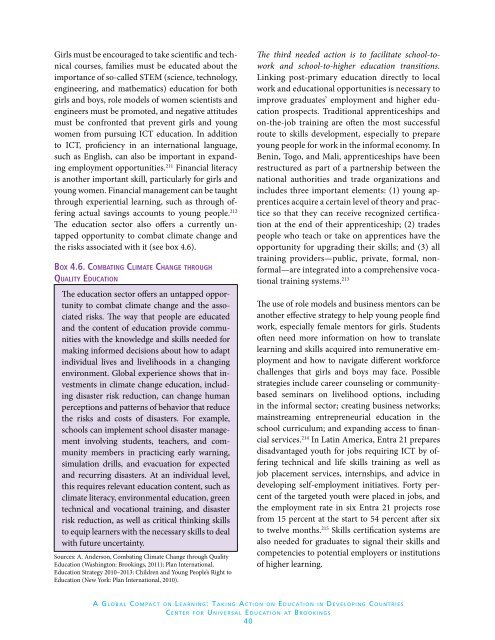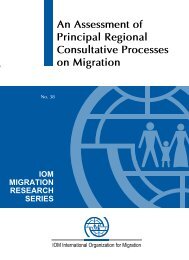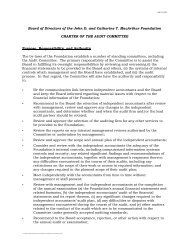A Global Compact on Learning - Brookings Institution
A Global Compact on Learning - Brookings Institution
A Global Compact on Learning - Brookings Institution
You also want an ePaper? Increase the reach of your titles
YUMPU automatically turns print PDFs into web optimized ePapers that Google loves.
Girls must be encouraged to take scientific and technical<br />
courses, families must be educated about the<br />
importance of so-called STEM (science, technology,<br />
engineering, and mathematics) educati<strong>on</strong> for both<br />
girls and boys, role models of women scientists and<br />
engineers must be promoted, and negative attitudes<br />
must be c<strong>on</strong>fr<strong>on</strong>ted that prevent girls and young<br />
women from pursuing ICT educati<strong>on</strong>. In additi<strong>on</strong><br />
to ICT, proficiency in an internati<strong>on</strong>al language,<br />
such as English, can also be important in expanding<br />
employment opportunities. 211 Financial literacy<br />
is another important skill, particularly for girls and<br />
young women. Financial management can be taught<br />
through experiential learning, such as through offering<br />
actual savings accounts to young people. 212<br />
The educati<strong>on</strong> sector also offers a currently untapped<br />
opportunity to combat climate change and<br />
the risks associated with it (see box 4.6).<br />
Box 4.6. Combating Climate Change through<br />
Quality Educati<strong>on</strong><br />
The educati<strong>on</strong> sector offers an untapped opportunity<br />
to combat climate change and the associated<br />
risks. The way that people are educated<br />
and the c<strong>on</strong>tent of educati<strong>on</strong> provide communities<br />
with the knowledge and skills needed for<br />
making informed decisi<strong>on</strong>s about how to adapt<br />
individual lives and livelihoods in a changing<br />
envir<strong>on</strong>ment. <str<strong>on</strong>g>Global</str<strong>on</strong>g> experience shows that investments<br />
in climate change educati<strong>on</strong>, including<br />
disaster risk reducti<strong>on</strong>, can change human<br />
percepti<strong>on</strong>s and patterns of behavior that reduce<br />
the risks and costs of disasters. For example,<br />
schools can implement school disaster management<br />
involving students, teachers, and community<br />
members in practicing early warning,<br />
simulati<strong>on</strong> drills, and evacuati<strong>on</strong> for expected<br />
and recurring disasters. At an individual level,<br />
this requires relevant educati<strong>on</strong> c<strong>on</strong>tent, such as<br />
climate literacy, envir<strong>on</strong>mental educati<strong>on</strong>, green<br />
technical and vocati<strong>on</strong>al training, and disaster<br />
risk reducti<strong>on</strong>, as well as critical thinking skills<br />
to equip learners with the necessary skills to deal<br />
with future uncertainty.<br />
Sources: A. Anders<strong>on</strong>, Combating Climate Change through Quality<br />
Educati<strong>on</strong> (Washingt<strong>on</strong>: <strong>Brookings</strong>, 2011); Plan Internati<strong>on</strong>al,<br />
Educati<strong>on</strong> Strategy 2010–2013: Children and Young People’s Right to<br />
Educati<strong>on</strong> (New York: Plan Internati<strong>on</strong>al, 2010).<br />
The third needed acti<strong>on</strong> is to facilitate school-towork<br />
and school-to-higher educati<strong>on</strong> transiti<strong>on</strong>s.<br />
Linking post-primary educati<strong>on</strong> directly to local<br />
work and educati<strong>on</strong>al opportunities is necessary to<br />
improve graduates’ employment and higher educati<strong>on</strong><br />
prospects. Traditi<strong>on</strong>al apprenticeships and<br />
<strong>on</strong>-the-job training are often the most successful<br />
route to skills development, especially to prepare<br />
young people for work in the informal ec<strong>on</strong>omy. In<br />
Benin, Togo, and Mali, apprenticeships have been<br />
restructured as part of a partnership between the<br />
nati<strong>on</strong>al authorities and trade organizati<strong>on</strong>s and<br />
includes three important elements: (1) young apprentices<br />
acquire a certain level of theory and practice<br />
so that they can receive recognized certificati<strong>on</strong><br />
at the end of their apprenticeship; (2) trades<br />
people who teach or take <strong>on</strong> apprentices have the<br />
opportunity for upgrading their skills; and (3) all<br />
training providers—public, private, formal, n<strong>on</strong>formal—are<br />
integrated into a comprehensive vocati<strong>on</strong>al<br />
training systems. 213<br />
The use of role models and business mentors can be<br />
another effective strategy to help young people find<br />
work, especially female mentors for girls. Students<br />
often need more informati<strong>on</strong> <strong>on</strong> how to translate<br />
learning and skills acquired into remunerative employment<br />
and how to navigate different workforce<br />
challenges that girls and boys may face. Possible<br />
strategies include career counseling or communitybased<br />
seminars <strong>on</strong> livelihood opti<strong>on</strong>s, including<br />
in the informal sector; creating business networks;<br />
mainstreaming entrepreneurial educati<strong>on</strong> in the<br />
school curriculum; and expanding access to financial<br />
services. 214 In Latin America, Entra 21 prepares<br />
disadvantaged youth for jobs requiring ICT by offering<br />
technical and life skills training as well as<br />
job placement services, internships, and advice in<br />
developing self-employment initiatives. Forty percent<br />
of the targeted youth were placed in jobs, and<br />
the employment rate in six Entra 21 projects rose<br />
from 15 percent at the start to 54 percent after six<br />
to twelve m<strong>on</strong>ths. 215 Skills certificati<strong>on</strong> systems are<br />
also needed for graduates to signal their skills and<br />
competencies to potential employers or instituti<strong>on</strong>s<br />
of higher learning.<br />
A <str<strong>on</strong>g>Global</str<strong>on</strong>g> Compa c t <strong>on</strong> <strong>Learning</strong>: Taking Acti<strong>on</strong> <strong>on</strong> Educat i o n in Developing Countries<br />
C e n t e r for Universal Educat i o n at <strong>Brookings</strong><br />
40






